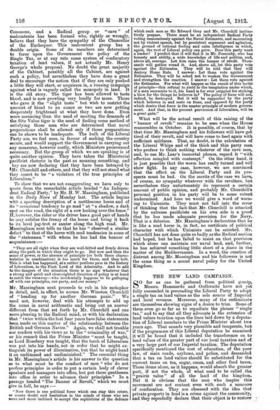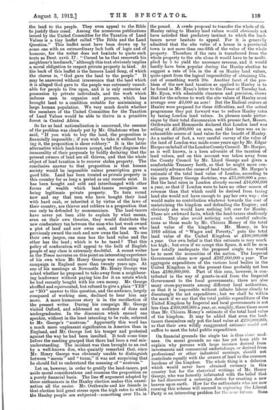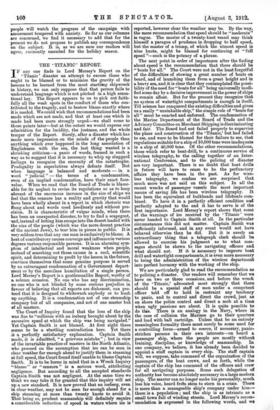THE NEW LAND CAMPAIGN.
SO far as can be gathered from political gossip, Messrs. Hemmerde and Outhwaite have not yet fully succeeded in persuading the Liberal Party to adopt a single tax on land values as the sole source of Imperial and local revenue. Moreover, many of the enthusiasts are themselves showing signs of a desire to trim. Some of them even go so far as to repudiate the phrase " single tax," and to say that all they advocate is the extension of land values taxation upon the lines laid down by a deputa- tion of Liberal members to the Prime Minister about two years ago. That sounds very plausible and temperate, but if the programme of this Liberal deputation be examined it will be found that it included the transference on to land values of the greater part of our local taxation and of a very large part of our Imperial taxation. The deputation specifically mentioned the cost of education, of the poor law, of main roads, asylums, and police, and demanded that a tax on land values should be substituted for the current taxes on tea, sugar, cocoa, and other food taxes. These items alone, as it happens, would absorb the greater part, if not the whole, of what used to be called the " prairie value " of all the land of the kingdom. But it is obvious that the men who inspire this movement are not content even with such a measure of confiscation. They are obsessed with the idea that private property in land is a crime against the community, and they -repeatedly declare that their object is to -restore the land to the people. They even appeal to the Bible to justify their creed. Among the numerous publications issued by the United Committee for the Taxation of Land Values is a tiny leaflet called " The Bible and the Land Question." This leaflet must have been drawn up by _some one with an extraordinary lack both of logic and of humour, for the writer does not hesitate to quote such texts as Dent. xxvii. 17 : " Cursed be he that removeth his neighbour's landmark," although this text obviously implies a moral obligation to respect private property in land. At the back of this leaflet is the famous Land Song, of which the chorus is, " God gave the land to the people." It may be answered without irreverence that the land which it is alleged God gave to the people was extremely unsuit- able for people to live upon, and it is only centuries of possession by private individuals, and the work which induces men to organize and procure, which has brought land to a condition suitable for maintaining a large human population. We very much doubt whether the members of the United Committee for the Taxation of Land Values would be able to thrive in a primitive forest in Central Africa.
So far as land nationalization is concerned, the essence of the problem was clearly put by Mr. Gladstone when he said, "If you wish to buy the land, the proposition is financially impossible ; if you wish to take it without buy- ing it, the proposition is sheer robbery." It is the latter alternative which land-taxers accept, and they disguise the immorality of their proposals by boldly declaring that the present owners of land are all thieves, and that the whole object of land taxation is to recover stolen property. The conclusive answer to that proposition is that human society would be impossible unless prescription gave a good title. Land has been treated as private property in this country for as long a period as any records exist. It has been bought and sold and interchanged with other forms of wealth which land-taxers recognize as being legitimate private property. To turn round now and say that men who have bought their land with hard cash, or inherited it by virtue of the laws of their country, are thieves and robbers is a proposition that can only be defended by monomaniacs. The land-taxers have never yet been able to explain by what means, even on their own theories, they would distribute the new confiscatory tax between the man who last week owned a plot of land and now owns cash, and the man who previously owned the cash and now owns the land. To use their own jargon, one man has the land value and the other has the land ; which is to be taxed ? That this policy of confiscation will appeal to the bulk of English people of any class is extremely doubtful. A recent writer in the Times narrates on this point an interesting experience of his own when Mr. Henry George was conducting his campaign in England more than twenty years ago, At one of his meetings at Newcastle Mr. Henry George was asked whether he proposed to take away from a neighbour- ing landowner without paying him for it an estate which be had recently bought with his own money. Mr. George shuffled and equivocated, but refused to give a plain "YES" or "NO" answer to this question, and the audience, largely composed of working men, declined to hear him any more. A more humorous story is in the recollection of the present writer. During his compaign Mr. George visited Oxford, and addressed an audience of dons and undergraduates. In the discussion which ensued one speaker, without in the least intending to be rude, referred to Mr. George's " nostrum." Apparently this word has a much more unpleasant signification in America than in England, and Mr. George lost his temper and protested against the way he had been insulted. It took some time before the meeting grasped that there had been a real mis- understanding. The incident was then brought to an end by a well-known don, who quaintly remarked that, since Mr. Henry. George was obviously unable to distinguish between " meum " and " tuum," it was not surprising that he should fail to understand the meaning of "nostrum."
Let us, however, in order to gratify the land-taxers, put aside moral considerations and examine the proposition on s, purely financial basis. The line off argument adopted by these enthusiasts in the Hanley election makes this exami- nation all the easier. Mr. Outhwaite and his friends in that election laid great stress upon the high rates to which. the Hanley people are subjected—something over lls. in the pound. A crude proposal to transfer the whole of th Hanley rating to Hanley land values would obviously not have satisfied that predatory instinct to which the laud- taxers never hesitate to appeal. For it is generally admitted that the site value of a house in a provincial town is not more than one-fifth of the value of the whole property. Therefore if the rate is transferred from the whole property to the site alone it would have to be multi- plied by 5 to yield the necessary revenue, and it would hardly have been popular during the Hanley election to suggest a rate of 55s. in the £ on Hanley land values, quite apart from the logical impossibility of obtaining 55s. out of something worth 20s. Another facet of the pro- blem of the new land taxation as applied to Hanley is to be found in Mr. Ryan's letter to the Times of Tuesday last. Mr. Ryan, with admirable clearness and precision, shows that for the scheme to work the site values of Hanley must average over £6,000 an acre ! But the Radical orators at Hanley were prepared for these difficulties, and the actual programme they put forward was to reduce Hanley rates by taxing London land values. In phrases made pictur- esque by their total disconnexion with prosaic fact, Messrs. Outhwaite and Hemmerde declared that London land was selling at £5,000,000 an acre, and that here was an in- exhaustible source of land value for the benefit of Hanley. As a matter of fact, a very careful survey of the value of the land of London was made some years ago by Mr. Edgar Harper on behalf of the London County Council. Mr. Harper, as is well known, is a keen advocate of the taxation of land values, and on this account was taken away from the County Council by Mr. Lloyd George and given a comfortable Treasury berth, so that he might more con- veniently advance the cause of land taxation. Mr. Harper's estimate of the total land value of London, according to the pure Henry George doctrine, was £15,000,000 a year. But the local rates in London already exceed £16,000,000 a year, so that if London were to have no other source of revenue than that which could be derived from taxing land she would not have enough to pay her own way ; she would make no contribution whatever towards the cost of maintaining the kingdom and defending the Empire ; and obviously she would have nothing left over for Hanley. These are awkward facts, which the land-taxers studiously avoid. They also avoid noticing such careful calcula- tions as those made by Mr. Chiozza Money of the total land value of the kingdom. Mr. Money, in his 1910 edition of " Wages and Poverty," puts the total land value of the United Kingdom at £106,000,000 a year. Our own belief is that this estimate is very much too high ; but even if we accept this figure, it will be seen how totally inadequate the proposed single tax would be to meet the necessities of the nation. The Imperial Government alone now spend £187,000,000 a year. The aggregate expenditure of the various local bodies in the United Kingdom is at the present time probably not less than £180,000,000. Part of this sum, however, is con- tributed in the way of grants-in-aid from the Imperial Government to the local governments ; there are also many cross-payments among different local authorities, so that it is impossible without infinite labour clearly to disentangle the net expenditure ; but we shall be within the mark if we say that the total public expenditure of the United Kingdom by Imperial and local governments is not less than £300,000,000 a year, or, roughly, three times more than Mr. Chiozza Money's estimate of the total laud value of the kingdom. It may be added that even the land- taxers themselves only put the land value at £250,000,000, so that their own wildly exaggerated estimate would not suffice to meet the total public expenditure.
On financial grounds the single tax is thus sheer mad- ness. On moral grounds no one has yet been able to explain why persons with large incomes derived from investments and commercial undertakings, or derived from professional or other industrial earnings, should not contribute equally with the owners of land to the common burdens of the kingdom. The whole thing is a delusion which would never have obtained currency in this country but for the rhetorical writings of Mr. Henry George, who was honestly infatuated with the belief that ho had discovered a sovereign device for creating a new heaven upon earth. How far the enthusiasts who are now running this scheme will succeed in capturing the Liberal Party is an interesting problem for the 'war future. Sane people will watch the progress of the campaign with amusement tempered with anxiety. So far as our columns are concerned, we find it necessary to add that for the present we do not propose to publish any correspondence on the subject. It is, as we are sure our readers will agree, eminently unsuited for the holiday season.






































 Previous page
Previous page